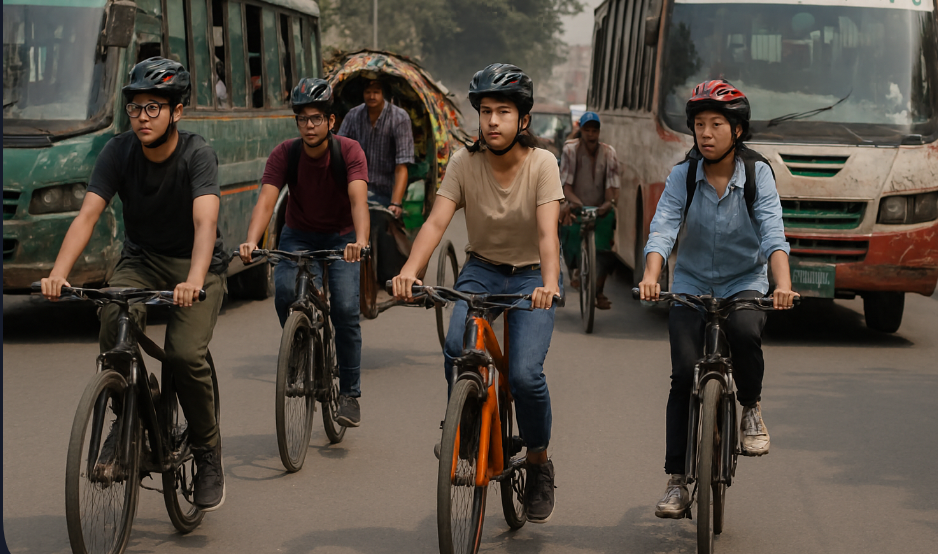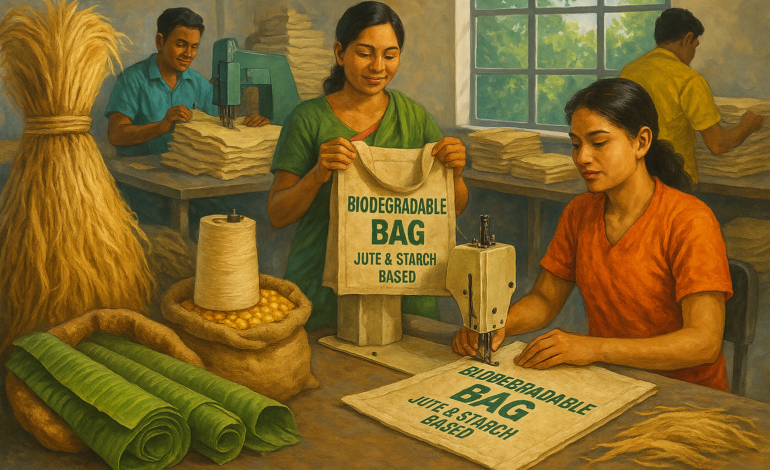Bangladesh’s Potential to Lead the World in Biodegradable Bag Manufacturing and Exports
In the face of mounting environmental challenges, biodegradable bags are rapidly gaining global attention as a sustainable alternative to plastic. As countries worldwide impose bans or restrictions on single-use plastics, the demand for eco-friendly packaging solutions has skyrocketed. Bangladesh, with its emerging manufacturing capabilities and commitment to sustainability, is uniquely positioned to become a global hub for biodegradable bag exports. But how realistic is this vision? Let’s explore the factors driving this potential and the challenges that need to be overcome.
Why Biodegradable Bags Matter
Traditional plastic bags contribute significantly to pollution, clog waterways, harm marine life, and persist in the environment for hundreds of years. Biodegradable bags, made from plant-based materials such as cornstarch, sugarcane, or other natural polymers, break down naturally and reduce harmful environmental impact.
Globally, consumers and governments are shifting preferences toward such alternatives. The biodegradable plastic market was valued at USD 5.43 billion in 2023 and is projected to grow to USD 12.29 billion by 2032, expanding at a compound annual growth rate (CAGR) of 9.5% during the forecast period (2025–2032).
Bangladesh’s Current Position in the Bag Manufacturing Industry
Bangladesh has long been a key player in the textile and packaging industries, boasting a robust manufacturing infrastructure and competitive labor costs. The country’s bag manufacturing sector, primarily focused on jute and plastic bags, employs millions and contributes significantly to exports.
In recent years, Bangladesh has also begun experimenting with biodegradable and eco-friendly packaging, supported by government policies promoting green industries. Several startups and SMEs are innovating with materials like jute composites, starch-based polymers, and biodegradable films.
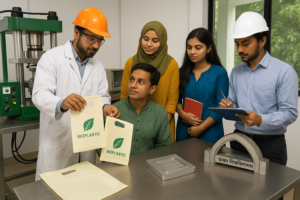
Advantages Bangladesh Has in Becoming a Global Exporter
Bangladesh possesses a unique combination of natural, economic, and policy-driven strengths that position it as a strong contender in the global biodegradable bag market. From resource availability to a supportive government stance, these factors collectively offer the right environment for scaling sustainable production and becoming a major export powerhouse.
1. Abundant Raw Materials
Bangladesh’s strong agricultural sector ensures an ample supply of eco-friendly raw materials such as jute; a crop historically tied to the country’s export identity. Additionally, rice husks, sugarcane bagasse, corn starch, and banana fibers—commonly available as agricultural byproducts—can be used to produce biodegradable films and bag materials. This easy access keeps production costs lower and ensures supply chain stability, a major advantage in sustainable manufacturing.
2. Skilled, Cost-Effective Workforce
With millions of workers engaged in the textile, jute, and light manufacturing industries, Bangladesh has a ready workforce well-versed in materials handling and packaging processes. Labor costs remain among the lowest in Asia, giving manufacturers a competitive edge in global pricing. Moreover, vocational training programs and tech incubators are increasingly introducing workers to green technologies and bioplastic production methods.
3. Strategic Geographic Location
Bangladesh is situated near major consumer markets in South Asia, Southeast Asia, and the Middle East, and has growing connectivity with Europe and North America. Its improving logistics and port infrastructure—particularly at Chattogram and Mongla—reduce transit times and shipping costs. This location advantage helps exporters quickly respond to global demand while maintaining supply chain efficiency.
4. Government Support and Sustainability Policies
Bangladesh’s government has taken firm steps to support environmentally responsible industries. Bans on single-use plastic bags, tax benefits for green manufacturing units, low-interest loans, and export incentives are helping biodegradable bag manufacturers gain traction. The Ministry of Environment, Forest and Climate Change has also shown interest in promoting biodegradable alternatives at both domestic and international levels.
5. Growing Environmental Awareness
A notable cultural shift toward environmental responsibility is emerging in Bangladesh. Local consumers are increasingly choosing eco-friendly alternatives, prompting businesses to adopt biodegradable packaging. This rising awareness provides a reliable domestic testing ground for new biodegradable bag designs and innovations, allowing companies to refine their products before scaling up for international markets.
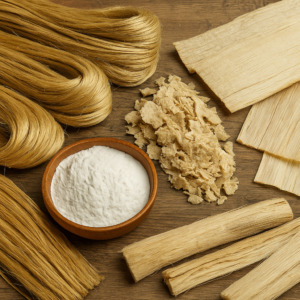
Challenges to Overcome
Despite Bangladesh’s potential to lead in biodegradable bag exports, several critical hurdles must be addressed. From technology and cost concerns to quality assurance and global branding, overcoming these challenges is essential to compete effectively in international markets and ensure long-term success in the green packaging industry.
-
Technology and Innovation Gap: The production of high-quality biodegradable bags requires advanced research, materials science, and precision engineering. Currently, Bangladesh lags in R&D infrastructure dedicated to bioplastics. Local manufacturers often rely on outdated machinery or imported know-how, which limits innovation. Investment in research centers, university-industry collaboration, and technology transfer is crucial for global competitiveness.
-
Quality Control and Certification: International buyers demand strict adherence to certifications such as ASTM D6400 or EN 13432 to verify that products are genuinely biodegradable and safe. Bangladesh lacks a strong national certification framework for such products. Building trusted quality assurance systems and third-party testing facilities is vital to gaining international trust and meeting export regulations.
-
Cost Competitiveness: Biodegradable bags are significantly more expensive to produce than conventional plastic alternatives, largely due to higher material costs and lower economies of scale. For Bangladesh to compete globally, manufacturers must streamline operations, automate processes, and benefit from government subsidies or carbon credits to bring prices closer to mass-market affordability.
-
Infrastructure and Supply Chain: Export success depends on robust logistics, warehousing, and a steady supply of raw materials. While Bangladesh’s ports are improving, road transport, waste collection, and recycling systems still face bottlenecks. Strengthening the entire supply chain—from raw material sourcing to last-mile delivery—is essential to support volume-based, time-sensitive international trade.
-
Market Awareness and Branding:
Despite its sustainability efforts, Bangladesh is not yet widely recognized as a leading producer of biodegradable packaging. Building a “Made in Bangladesh” brand for green products requires coordinated marketing campaigns, global trade fair participation, and strategic partnerships. Public and private sector collaboration is key to positioning Bangladesh as a credible exporter in the eco-packaging space.
Success Stories and Emerging Players
Several Bangladeshi companies have already made strides in the biodegradable products market, particularly with jute-based eco bags. These bags are popular across Europe and North America for their durability and natural biodegradability. Organizations like CORR-The Jute Works and other local manufacturers have successfully tapped into these markets by offering sustainable alternatives to plastic bags.
Beyond jute, a few startups are working on starch-based biodegradable films and PLA-based packaging. These materials are gaining attention from eco-conscious retailers, especially in the food and fashion sectors. Some companies are exploring export opportunities with prototype products made from locally sourced materials like corn and potato starch, aligning with global demand for compostable packaging.
International partnerships are also helping to boost Bangladesh’s profile. Collaborations with UNIDO and IJSG, along with participation in global trade fairs, are opening new doors. These platforms allow Bangladeshi businesses to showcase their innovations and build credibility in the competitive sustainable packaging market.
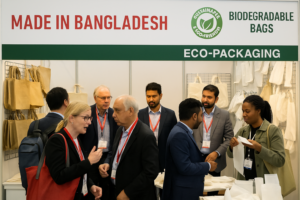
What Needs to Be Done?
To unlock Bangladesh’s full potential in the biodegradable bag export market, strategic actions must be taken across multiple sectors. From innovation to international marketing, a coordinated approach is required to build a globally competitive and sustainable industry.
Increase Investment in R&D
A thriving biodegradable industry relies on cutting-edge research into alternative materials like starch blends, PLA (polylactic acid), and cellulose-based polymers. Bangladesh needs to develop public-private partnerships to fund R&D labs, university collaborations, and pilot projects focused on reducing production costs and improving product durability. Encouraging local startups and attracting international green tech investors can also accelerate innovation.
Expand Training and Capacity Building
Developing human capital is critical for scaling the industry. Training programs should be established for workers, engineers, and entrepreneurs in areas such as green chemistry, bioplastic production, machine operation, and sustainable packaging design. Technical institutes, universities, and industry bodies can play a role in creating a skilled workforce to meet future demand.
Enhance Certification and Quality Standards
To penetrate international markets, Bangladeshi manufacturers must meet global biodegradability, compostability, and product safety standards. Setting up national testing labs, affiliating with global certification bodies (like TÜV Austria or BPI), and ensuring transparent monitoring systems will boost buyer confidence. Government support in subsidizing the cost of certification can further encourage compliance.
Promote Policy Support
While existing government initiatives are commendable, deeper policy backing is needed. This includes tax incentives for green entrepreneurs, fast-tracking export licenses, reducing import duties on eco-friendly machinery, and creating industrial zones dedicated to sustainable products. Long-term policy consistency will provide the stability needed for manufacturers to invest in biodegradable technologies.
Market Bangladesh Globally
To establish Bangladesh as a trusted supplier of biodegradable bags, strong branding and outreach are essential. Participation in international trade fairs, eco-product expos, and sustainability conferences will help showcase Bangladesh’s innovations. Government and private sector coordination in digital campaigns, green certifications, and trade diplomacy can effectively promote the country’s eco-friendly manufacturing credentials to a global audience.
A Realistic and Green Future
Bangladesh’s journey toward becoming a global hub for biodegradable bag exports is both feasible and timely. Leveraging its natural resources, workforce, and growing environmental commitment, the country can carve out a niche in the expanding green packaging market. However, realizing this vision requires coordinated efforts among government, industry, and academia to innovate, scale, and meet international demands.
As global consumers and governments push harder against plastic pollution, Bangladesh has a prime opportunity to lead the biodegradable revolution and contribute significantly to a greener planet — while boosting its own economy and global standing.
Want to discover the inspiring young entrepreneurs behind Bangladesh’s green revolution? Explore how innovative startups are driving eco-friendly change and shaping a sustainable future here.

